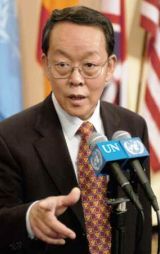Russia, China expected to oppose US over Darfur
By Evelyn Leopold
UNITED NATIONS, Feb 15 (Reuters) – The United States and its allies are expected to face opposition from Russia and China in the U.N. Security Council for targeted sanctions to pressure government, militia and rebel forces to end the bloodshed in Sudan’s Darfur region.

|
|
Chinese Ambassador to the United Nations Wang Guangya speaks after his country abstained during the U.N. Security Council vote, at the United Nations in New York, September 18, 2004. The Security Council adopted a resolution on Saturday that threatens oil sanctions against Sudan if Khartoum does not stop atrocities in the Darfur region. The vote was 11-0, with four abstentions, on the U.S.-drafted resolution that also calls for an expanded African Union monitoring force and a probe into human rights abuses including genocide. China, Russia, Algeria and Pakistan abstained. |
Junior diplomats on Tuesday begin a “walk through” of an eight-page U.S.-drafted resolution, which authorizes a large peacekeeping force in southern Sudan in hopes that a recent landmark accord there will spur peace in Darfur in the west.
Negotiations on the resolution are expected throughout the week and U.S. officials are hoping for a vote by the end of the month.
Council sources anticipate opposition from Russia and China, which have veto power, as well as Algeria. All three have rejected previous calls for sanctions to give Khartoum more time to rein in a pro-government militia, blamed for much of the killings, rape and pillaging.
The draft calls for an assets freeze and travel ban within 30 days on those responsible for the violence in Darfur, where tens of thousands have died and 2 million people are homeless in two years of escalating fighting.
PEACEKEEPING FORCE
Half of the resolution deals with authorizing a more than 10,000-strong peacekeeping force for southern Sudan, with the power to protect civilians from the imminent threat of violence. The force is to prop up a Jan. 9 peace agreement that ended 21 years of a north-south civil war.
The new U.N. mission in Sudan, called UNMISUD, would be in place for an initial six months while U.N. Secretary-General Kofi Annan explores options on how to assist an African Union force currently monitoring violations in Darfur. But diplomats did not expect U.N. blue helmeted soldiers in Darfur.
“We believe the AU should be supported,” said U.S. Deputy Ambassador Stuart Holliday, recalling that Jan Pronk, the special envoy to Sudan, has said “even if the entirety of the AU force were deployed to Darfur, it still wouldn’t be enough.”
The draft resolution demands accountability for atrocities “through internationally accepted means” but avoids saying where the perpetrators should be tried. This follows a dispute over a tribunal between the United States and Europe, including Britain.
Diplomats said the Bush administration so far had failed to get enough council support for its proposed new court to be set up in Arusha, Tanzania, although it has promised funds for it.
At least nine out of 15 council members prefer the new International Criminal Court in the Hague, which Washington rejects, fearing frivolous prosecution of U.S. troops abroad.
If no agreement is reached by the time of a vote, the resolution may be adopted without mentioning the name of a court.
“We don’t seek to defer responsibility for the tough decisions …but we also understand that we don’t want to hold up the agreement we can reach,” Holliday said.
Other measures in the resolution include an arms embargo on Darfur unless a Security Council committee authorizes weapons. And it demands “offensive military flights” stop unless the council committee approves in advance.
Oil sanctions are also threatened if the situation in Darfur deteriorates, but support is lacking to impose them.
